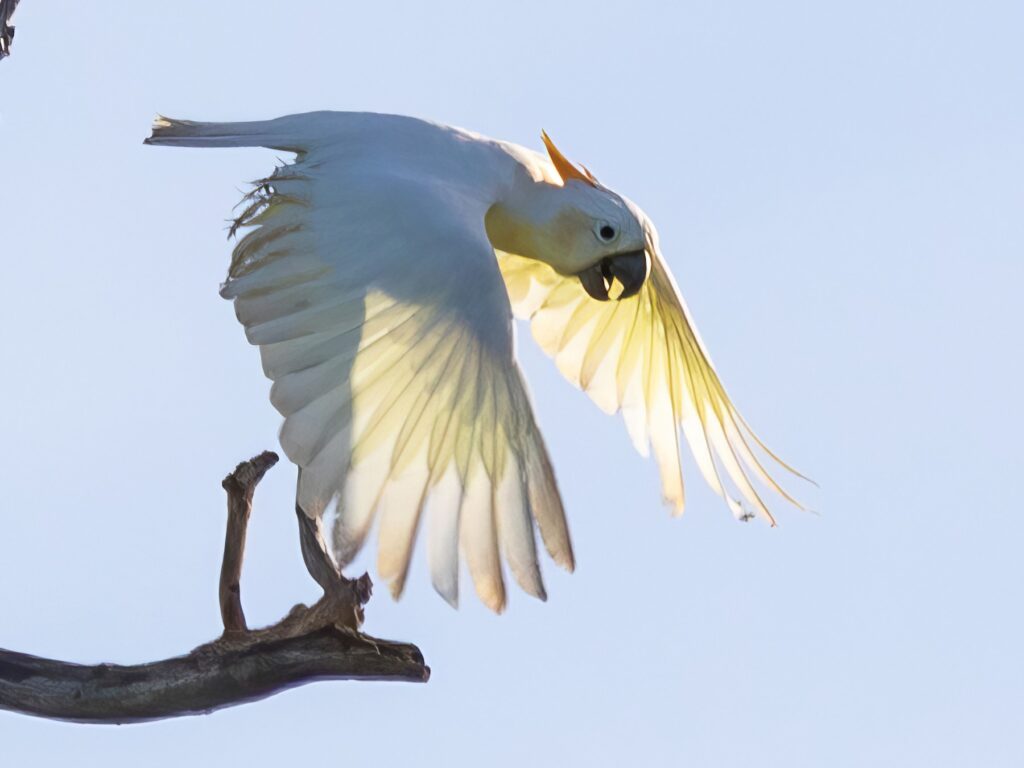If you are considering adding a Citron Cockatoo to your family, it is important to understand their unique personality and behavior traits. These stunning birds are known for their vibrant colors and playful nature. In this blog post, we will take an in-depth look at the personality and behavior of Citron Cockatoo information, as well as their lifespan, cost, noise level, and breeding habits.
Unveiling the Personality of Citron Cockatoos
Citron Cockatoos are among the most captivating companions in the bird world, with their vibrant personalities shining through in every interaction. These feathered friends are not just visually stunning but are also incredibly smart and sociable. They possess a playful nature that endears them to anyone fortunate enough to spend time with them. Their intelligence means they’re always on the lookout for engaging activities, making interactive play a key part of their daily routine. However, beneath their exuberant exterior lies a sensitive soul; Citron Cockatoos flourish under a caring and gentle approach, particularly during training sessions. Their ability to bond deeply with their owners is remarkable, offering a level of loyalty and affection that is heartwarming. This unique blend of traits makes the Citron Cockatoo a delightful yet complex companion, capable of enriching the lives of those who understand and appreciate their nuanced personalities.
The Lifespan of Citron Cockatoos: What to Expect
Citron Cockatoos boast a considerable lifespan, often reaching up to 50 years when cared for in captivity. This longevity highlights the significance of a long-term commitment from their owners. Prospective and current owners must prepare for decades of companionship, ensuring they can provide consistent care throughout the bird’s life. The key to a healthy and happy Citron Cockatoo lies in a balanced diet, regular physical exercise, and ample mental stimulation to cater to their intelligent nature. It’s also crucial to establish routine veterinary check-ups to monitor their health and prevent potential issues before they arise. Understanding and preparing for the duration of care these magnificent birds require is essential for anyone considering a Citron Cockatoo as a pet, ensuring a fulfilling life for both the bird and its human companion.
Understanding the Cost of Owning a Citron Cockatoo
When contemplating the addition of a Citron Cockatoo to your family, the financial aspect is a crucial factor to consider. Initial acquisition costs for these birds can be steep, ranging between $1,000 to $3,000, but this is just the tip of the iceberg. Beyond the purchase price, prospective owners need to factor in the long-term care expenses that accompany these vibrant companions. A substantial portion of your budget will go towards high-quality feed designed to meet their nutritional needs, as well as a variety of toys and enrichment activities to keep their intelligent minds stimulated and engaged.
Housing for a Citron Cockatoo is another significant consideration. They require spacious cages that provide enough room for movement and play, which may come with a hefty price tag. Additionally, given their long lifespan, it’s vital to invest in durable and safe materials that will stand the test of time. Regular visits to an avian veterinarian for health check-ups and vaccinations are non-negotiable for maintaining their health and well-being, adding another layer to the overall cost.
Lastly, unforeseen expenses such as emergency medical care or special dietary needs can arise, underscoring the importance of financial preparedness when committing to a Citron Cockatoo. Prospective owners should thoroughly evaluate their budget and readiness for the financial responsibility that comes with these captivating birds, ensuring a harmonious and enduring companionship.
Navigating the Noise: The Vocal Nature of Citron Cockatoos
Citron Cockatoos are not shy when it comes to expressing themselves through sound. Their vocal nature is an integral part of their personality, showcasing a wide range of calls, from soft chirps to powerful squawks that can easily fill a space. This expressive behavior is often a manifestation of their emotional state or a means to communicate with their human companions. While their vocalizations are a charming aspect of their character, they can present challenges for some households.
Living with a Citron Cockatoo means embracing their vocal expressions, which include not just calls and squawks but also the ability to mimic sounds and, at times, words. This can be delightful and entertaining but may also require adjustments, especially in environments where noise levels need to be kept low. It’s crucial for potential Citron Cockatoo owners to realistically assess their living situation and consider whether they can accommodate the noise levels of these spirited birds.
Mitigating excessive noise involves engaging your Citron Cockatoo for sale in stimulating activities and providing a variety of toys that encourage play and exploration. Interaction and socialization play key roles in keeping them mentally satisfied and less prone to loud vocalizations out of boredom or distress. Understanding and addressing the needs behind their vocal behavior are essential steps in fostering a harmonious living situation with these expressive and affectionate companions.
Breeding Citron Cockatoos: An Overview
Embarking on the journey of breeding Citron Cockatoos is not for the faint-hearted. It requires a deep understanding of their needs, behaviors, and the right environmental conditions. Successful breeding hinges on providing a calm, stable, and enriching environment, alongside ensuring that both the male and female birds are healthy and of breeding age. The selection of a compatible mate is crucial, as Citron baby Cockatoos for sale form strong bonds and may not breed successfully with just any partner.
A spacious and secure nesting area is imperative, mimicking their natural habitats as closely as possible to encourage breeding behaviors. Prospective breeders must also be ready to commit a considerable amount of time to monitor and support the pair during the breeding season, which includes preparing for the potential of hand-rearing chicks should the need arise.
Moreover, it’s vital to approach breeding with a sense of responsibility towards the species and potential offspring. With numerous Citron Cockatoos awaiting adoption, thoughtful consideration should be given to the implications of bringing more birds into the world. Breeding should be aimed at conservation and the enhancement of the species’ genetic diversity rather than for profit or casual interest.


